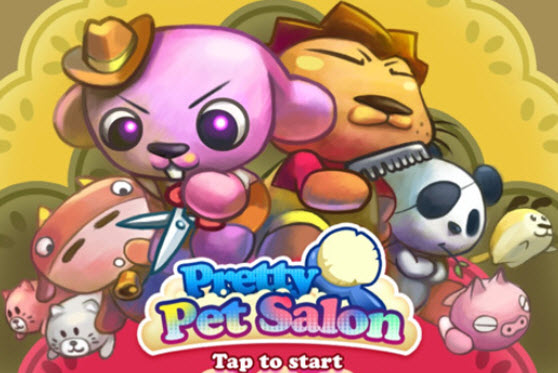Pretty Pet Salon debuted in the Apple iTunes App Store in January 2011. It generated more than 7 million downloads on iOS and later on Android. But on Jan. 12, it mysteriously disappeared from the App Store — and then it returned again in a different form at the end of March. Why this happened is an interesting tale.
The app, created by Hong Kong–based Animoca, a division of Outblaze Ventures, reportedly ran afoul of Apple because it violated an Apple policy that prohibits app creators from manipulating the top 25 rankings on the App Store. But Animoca says it did nothing wrong and it truly doesn’t understand why Apple banned it without explanation. [Read our investigative report on unaware developers caught in Apple’s dragnet.]
Animoca admits that it used 25 different third-party marketing services. Some of these services may use bots, or fake users with fake iTunes accounts, to download apps in huge numbers and artificially inflate their rankings on the charts. Others use humans to do the same thing, downloading lots of games to fake accounts where the games are never used. Other services generate fake reviews. But it’s difficult for a company like Animoca to know whether its third-party marketing service is legitimately promoting an app or not. And Animoca’s own experience may very well scare legitimate developers away from doing anything that could be construed as risky — or innovative — in their marketing.
Developers want answers
Animoca and third-party marketers aren’t necessarily running from Apple’s enforcement. Rather, they just want to know what they did wrong. Ibrahim El-Mouelhy, a spokesman for Animoca, said, “We have never used bots or intentionally engaged in any manipulation activities.”
The manipulation of the App Store rankings was a big enough problem for Apple to issue a statement on Feb. 6. In a message on its developer page, Apple said, “Once you build a great app, you want everyone to know about it. However, when you promote your app, you should avoid using services that advertise or guarantee top placement in App Store charts. Even if you are not personally engaged in manipulating App Store chart rankings or user reviews, employing services that do so on your behalf may result in the loss of your Apple Developer Program membership.”
An Apple representative placed its first call to Animoca in early January. The caller talked to an Animoca representative whose first language was not English. Based on that conversation about “fake reviews,” the situation escalated. Animoca didn’t know what Apple was referring to and put the word out to its third-party marketing services to stop whatever they were doing. It didn’t actually know if they were doing anything wrong. But word got back to Apple, apparently, that Animoca had put this message out. This may have looked suspicious.
On Jan. 11, Animoca published a blog post about how the top charts on the App Store could be improved, simply by hiding the apps that a user already had installed. The next day, the company’s apps were removed.
Animoca acknowledged that it used third-party marketing service Gtekna, a two-person firm headed by chief executive Chang-Min Pak. Pak told us that his company only uses legitimate methods, including giving away gift cards, to help spread a game. Gtekna did change its website after Apple’s February statement so that it no longer guaranteed placement in the top 25 rankings. But Pak said his company has worked with thousands of app developers, and none of them has been banned, to his knowledge.
No one disputes that it’s important to get into the top 25 rankings, since the App Store isn’t great at helping apps gain notice among the sea of more than 600,000 active apps. The temporary boost from marketing services can be a godsend for app makers. Once on the charts, the apps receive more visibility and more downloads, and eventually, they gather enough momentum to live on their own, if they’re good enough to please consumers. Pushing an app up by promoting it to people is fair game, but pushing an app to people who have no intention of using it, or completely automating the process of app downloads, will get an app maker into trouble.
El-Mouelhy said that Apple’s communication to Animoca did not spell out why it was banned. An Apple spokesman told us it was for a violation of guideline 3.10, which says, “Developers who attempt to manipulate or cheat the user reviews or chart ranking in the App Store with fake or paid reviews, or any other inappropriate methods will be removed from the iOS Developer Program.” Beyond that, Apple declined comment.
“We made several attempts to understand why this happened and how to rectify it,” El-Mouelhy said. “We offered an all-expense paid trip to Apple to visit us in Hong Kong to review our books. Apple didn’t reply.”

